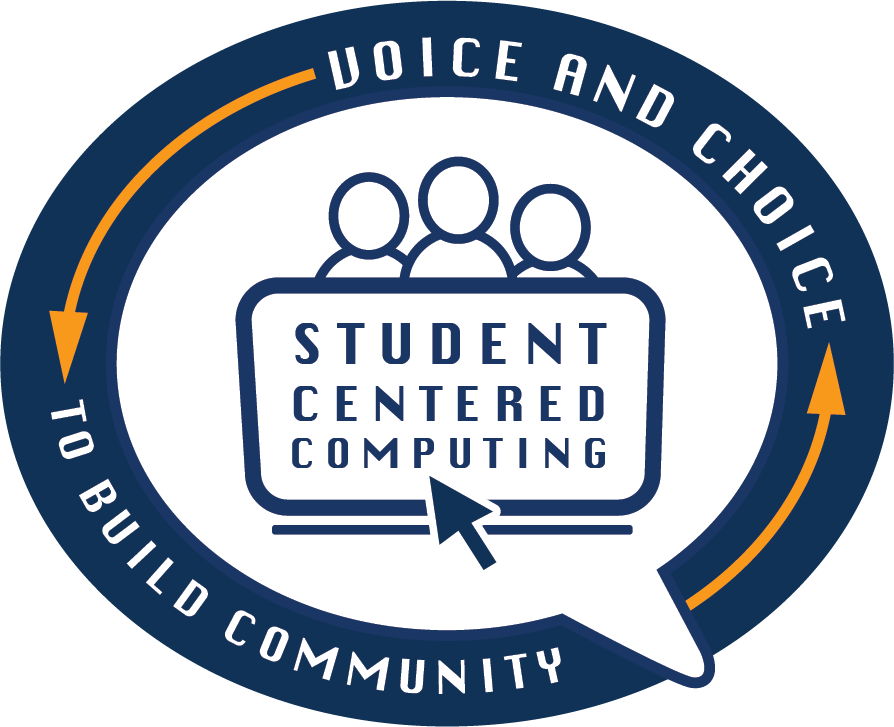CAPACiTY Professional Learning Opportunities for Summer 2022
Student-Centered Computing Summer Professional Development

Introduction to Software Technology
Middle School Computer Science Foundations
Student-Centered Computing (SCC), a pedagogical framework developed through the NSF-supported CAPACiTY project, offers schools a free, full-year curriculum for the Introduction to Software Technology course, and semester-long curricula for the Computer Programming and Interactive Design Middle School Computer Science Foundations courses. The SCC curricula, described in more detail below, enables students to develop digital technology and programming skills as they research and design solutions for a problem of their choice.
Come learn how to implement Student-Centered Computing in your classroom!
To apply, fill out the application at this link:
https://gatech.co1.qualtrics.com/jfe/form/SV_d7nV7GEjNtcv00u
WHAT
- 20 hours per week online professional institutes
- 1.5 hour per day of live, online instruction each morning
- Approximately 2.5 hours/day of additional computer-based work required
- SCC Framework week required for all participants who have not participated in previous CAPACiTY institutes
WHEN
Introduction to Software Technology (IST)
June 6-10
Student-Centered Computing Framework
June 13-17
Introduction to Software Technology (IST) course details
Middle School Computer Science
Foundations of Computer Programming plus Foundations of Interactive Design
June 6-10
Student-Centered Computing Framework
June 20-24
Middle School Computer Science Foundations course details
WHERE
Online
COMPENSATION
Teachers receive a $250 stipend for successful completion of each week, with a maximum of $750.
Student-Centered Computing
Voice and Choice to Build Community
The Student-Centered Computing (SCC) curriculum promotes the development of computational thinking (CT) skills by engaging students in culturally authentic and community focused problem-driven learning.
The SCC curriculum centrally features:
- Project contexts that require exploration of real-world problems and challenges.
- Practices and activities that promote personal and social student engagement.
Introduction to Software Technology (IST)
Semester 1: Interpersonal and Narrative Website Design Challenges
Student pairs select and reflect on a focal problem they would like to address. They conduct internet research, explore the power of storytelling, create a design vision, and develop a narrated PowerPoint presentation that addresses their chosen problem. Students then work in groups to design and build a website that increases public awareness about their chosen problem. In the process they develop an online resume and portfolio, are introduced to HTML tags and CSS, and explore cybersecurity, computer networking, and the issues of privacy.
Semester 2: Programming with EarSketch and Thunkable Mobile Application Development
EarSketch is a browser-based platform that teaches programming through music mixing. Students learn to code in Python while manipulating loops, composing beats, and applying effects to a multi-track digital audio workstation. The students explore how music affects emotion and create two soundtracks, one to serve as an introduction to a game that relates to their focal problem and the second to elicit emotion when playing the game. Using Thunkable, students then learn to create a basic mobile game app. In the process, they learn event-centered programming, how to apply conditional control structures, and how to define basic custom functions. As a final product, they design, build, and showcase a game that relates to their original problem and that integrates the music created in the EarSketch unit.
Middle School Foundations of Interactive Design
Website and Game Design Challenges
Student pairs select and reflect on a problem they would like to address. They conduct Internet research and use PowerPoint to begin the outline of a website that is intended to increase community awareness about their chosen problem. They then work in groups to design and build the website. Selecting important facts from their website, students lastly use Thunkable to design a short mobile app quiz game that addresses their chosen problem, as an introduction to event-centered programming.
Middle School Foundations of Computer Programming
Arduino Exploration and Programming Challenges
Student pairs begin by selecting a topic of interest. They next learn how music can relate to the topic and modify a pre-coded arduino piano simulation to explore data representation (i.e. bits and bytes) and introductory programming. Students then record basic sounds from the simulation and upload them into EarSketch, a browser-based platform that teaches programming through music mixing. They computationally remix the sounds into a set of mini-songs, the length of a TikTok video, that relates to the students’ topic of interest. Students lastly explore event-centered programming by turning their set of mini-songs into a playlist mobile app, complete with images and descriptions of their musical inspiration, which they share with others in a class showcase.


